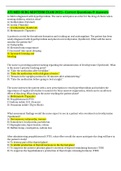MANAGERIAL
ECONOMICS
D0T96a& D0T99a
Samenvatting 2024
,Lecture 1: Game theory and competition
What is managerial economics?
Managerial economics: Application of economic theory and methods to the study
of managerial problems:
1. Strategic behavior of firms in the marketplace
a. Industrial organization
b. Economics of innovation
2. Strategic relations within the boundary firm
a. Information economics
b. Bargaining (= onderhandelen)
Which methods?
Fundamental economic principles (e.g. optimality, discounting)
Game theory to analyze strategic interactions
Abstract modeling
The problems of the manager
Market analysis
Marketing& sales marketing strategy
Human resources and hiring decisions
Planning R&D and IP strategy
Game theory: fundamentals
Game theory in managerial economics
Game theory: a mathematical tool used to represent interactions in a treatable
way
“games”: stylized representation of agents’ goals, information and capabilities
Game representation, strategies and payoffs
In a game:
- Preferences = a higher numerical value, called payoff, to outcomes that
are more preferred to them (voorkeuren hebben een hogere warden)
- Strategies: actions or sequences of actions that agents can choose to
achieve their goals
- Outcome: the result of all player’s strategies, and chance if the game
involves stochastic/ random elements
Game theory and individual rationality
In game theory we assume that agents are individually rational:
1. Have rational preferences:
a. Ability to rank the outcomes (favorite to least favorite)
b. Trasitive
2. Payoff-maximizing:
a. Players choose their strategies in order to achieve the highest payoff
for themselves (Doesn’t mean they’re selfish)
1
,Three main categories of games
Strategic Extsenive Sequential& bayesian
Strategic games
1. Static
a. One-shot game: 1 interaction
b. Simultaneous choice: players choose their strategy without
knowledge of the other players’ choice
2. Complete information
a. All players know the capabilities (strategies available) of every other
player.
b. All players know the consequences (payoffs) of every combination of
strategies.
Complete information ≠ certainty
Games often involve quantifiable risks => uncertainty
However: sometimes players know something the other don’t =
asymmetric information
Strategic games allow for uncertainty, but not asymmetric information
A board taxonomy of games
Complete/ perfect information Asymmetric information
Static Strategic game Bayesian games
Dynamic Extensive games, repeated Sequential (Bayesian) games
games
Examples:
- Rock-paper-scissors: strategic
- Chess: extensive
- Sealed-bid auction: bayesian
- Poker: sequential
- Monopoly: extensive
- Starcraft II: sequential
Strategic games: abstract form
Strategic game:
1. Set of players
2
, For example: P= {player1, player2}
2. Set of actions available for each player
For example: Ap1= {defect, cooperate}, Ap2= {defect, cooperate}
Action something you can do
Strategy what you will do
In strategic game action= strategy
3. Payoff functions:
o There’s also another way to represent this:
Strategic games: normal (payoff-matrix) form
Finding an equilibrium: elimination of dominated strategies
Start with P1 If P2 plays X/Y/Z what is the best/ worst option
In every scenario H = worst option=> eliminate H
Observe P2 If P1 plays D/C what is the best/ worst option
X is ALWAYS the best option => eliminate Y and T
After elimination: P2 has only one choice => P1 decides=>
<D,X>
<D,X> = equilibrium in dominant strategies
3
ECONOMICS
D0T96a& D0T99a
Samenvatting 2024
,Lecture 1: Game theory and competition
What is managerial economics?
Managerial economics: Application of economic theory and methods to the study
of managerial problems:
1. Strategic behavior of firms in the marketplace
a. Industrial organization
b. Economics of innovation
2. Strategic relations within the boundary firm
a. Information economics
b. Bargaining (= onderhandelen)
Which methods?
Fundamental economic principles (e.g. optimality, discounting)
Game theory to analyze strategic interactions
Abstract modeling
The problems of the manager
Market analysis
Marketing& sales marketing strategy
Human resources and hiring decisions
Planning R&D and IP strategy
Game theory: fundamentals
Game theory in managerial economics
Game theory: a mathematical tool used to represent interactions in a treatable
way
“games”: stylized representation of agents’ goals, information and capabilities
Game representation, strategies and payoffs
In a game:
- Preferences = a higher numerical value, called payoff, to outcomes that
are more preferred to them (voorkeuren hebben een hogere warden)
- Strategies: actions or sequences of actions that agents can choose to
achieve their goals
- Outcome: the result of all player’s strategies, and chance if the game
involves stochastic/ random elements
Game theory and individual rationality
In game theory we assume that agents are individually rational:
1. Have rational preferences:
a. Ability to rank the outcomes (favorite to least favorite)
b. Trasitive
2. Payoff-maximizing:
a. Players choose their strategies in order to achieve the highest payoff
for themselves (Doesn’t mean they’re selfish)
1
,Three main categories of games
Strategic Extsenive Sequential& bayesian
Strategic games
1. Static
a. One-shot game: 1 interaction
b. Simultaneous choice: players choose their strategy without
knowledge of the other players’ choice
2. Complete information
a. All players know the capabilities (strategies available) of every other
player.
b. All players know the consequences (payoffs) of every combination of
strategies.
Complete information ≠ certainty
Games often involve quantifiable risks => uncertainty
However: sometimes players know something the other don’t =
asymmetric information
Strategic games allow for uncertainty, but not asymmetric information
A board taxonomy of games
Complete/ perfect information Asymmetric information
Static Strategic game Bayesian games
Dynamic Extensive games, repeated Sequential (Bayesian) games
games
Examples:
- Rock-paper-scissors: strategic
- Chess: extensive
- Sealed-bid auction: bayesian
- Poker: sequential
- Monopoly: extensive
- Starcraft II: sequential
Strategic games: abstract form
Strategic game:
1. Set of players
2
, For example: P= {player1, player2}
2. Set of actions available for each player
For example: Ap1= {defect, cooperate}, Ap2= {defect, cooperate}
Action something you can do
Strategy what you will do
In strategic game action= strategy
3. Payoff functions:
o There’s also another way to represent this:
Strategic games: normal (payoff-matrix) form
Finding an equilibrium: elimination of dominated strategies
Start with P1 If P2 plays X/Y/Z what is the best/ worst option
In every scenario H = worst option=> eliminate H
Observe P2 If P1 plays D/C what is the best/ worst option
X is ALWAYS the best option => eliminate Y and T
After elimination: P2 has only one choice => P1 decides=>
<D,X>
<D,X> = equilibrium in dominant strategies
3










